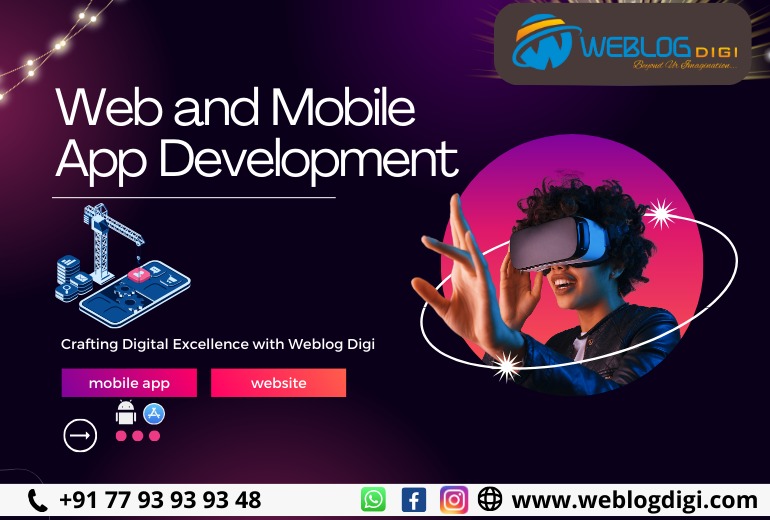Web and Mobile App Development: Crafting Digital Excellence with Weblogdigi

In the digital age, where information and services are at our fingertips, web and mobile app development is an indispensable cornerstone of modern technology. Whether it’s the convenience of accessing a website on your laptop or a mobile app on your smartphone, these digital tools have become an integral part of our daily lives. At Weblogdigi, we understand the significance of these technologies, and we’re committed to guiding you through the fascinating world of web and mobile app development.
Why Web and Mobile App Development Matter
Before we dive into the intricacies of web and mobile app development, it’s essential to grasp why these technologies matter more than ever. According to a recent Statista study, over six billion people worldwide use smartphones. The ubiquity of mobile devices has made mobile web development a critical component of web development.
If you’ve ever struggled to navigate a poorly designed mobile web app or native app on your phone, you know how frustrating it can be. For developers, supporting a diverse range of mobile clients with their unique quirks can be a challenging task. This challenge drives the need for proficient web and mobile app development.
Mobile Web App vs. Native App vs. Hybrid App
One of the first decisions in web and mobile app development is choosing the right approach. Should you go for a mobile web app, a native app, or a hybrid app? The answer depends on several factors, including your target audience, your app’s objectives, and your available development resources.
Mobile web apps are a quicker and cost-effective solution for broad device support. However, if your app relies heavily on device-specific features, a native app might be necessary. Hybrid apps, combining web technologies with native app elements, can be a middle ground.
It’s essential to consider your audience’s preferences and your project’s specific requirements when making this decision. As mobile devices continue to evolve, staying informed about the latest trends and user behaviours is crucial.
Planning for Mobile Web Development
A critical aspect of mobile web development is meticulous planning. Identifying your requirements and researching the capabilities of the target platform is essential. Failing to do so can lead to issues later in the development process.
Assuming that code for a desktop browser will work seamlessly on a mobile browser is a common pitfall. Mobile browsers have unique characteristics and limitations. Features like the HTML5 <video> tag’s autoplay functionality may not work on mobile browsers. CSS properties, such as transitions and opacity, might not be consistently supported. Testing your app on various devices and browsers is critical to ensure a smooth user experience.
Additionally, consider the device’s lifespan. Mobile devices have shorter lifespans than desktop displays, so you must design your app to accommodate different screen resolutions, orientations, and high-resolution displays like Apple’s Retina screens.
Optimizing Your Mobile Web Application for Performance
Slow-loading web apps are a significant turn-off for users. Research shows that 53% of mobile site visits are abandoned if loading takes longer than three seconds. Search engines also factor in load times when ranking pages.
To optimize performance, focus on:
- Image Optimization: Use online image optimizers to reduce image load times.
- Code Compression: Compress JavaScript and CSS files to improve load times.
- Database Queries: Optimize queries and use server-side caching to minimize database requests.
- Content Delivery Networks (CDN): CDNs can distribute resources, save bandwidth, and improve download performance.
Tools for Developing Mobile Web Apps
Choosing the right tools is crucial for efficient development. JavaScript mobile web app frameworks, such as jQuery Mobile and Sencha Touch, can simplify the development process and ensure cross-browser compatibility.
Responsive frameworks like Bootstrap and Foundation help streamline UI design for various screen sizes and types. These frameworks provide pre-built layouts and UI elements, reducing the effort required to design your app.
Debugging and Testing Mobile Web Apps
Debugging mobile web apps can be challenging, but modern web development tools make it more accessible. Tools like Chrome with DevTools provide remote debugging and allow you to edit JavaScript and CSS on the fly.
To test your app’s layout and compatibility, consider using online tools like BrowserStack, which provide emulated views of your site on different devices and browsers.
Choosing Intelligent Mobile Development Solutions
In an ever-evolving digital landscape, web and mobile app development are essential for staying competitive and meeting user expectations. The choice between web, native, or hybrid app development depends on your project’s objectives and resources.
At Weblogdigi, we’re here to guide you through the dynamic world of web and mobile app development. Stay informed, plan meticulously, optimize for performance, choose the right tools, and remember that a successful app is one that satisfies its users’ needs and expectations.
The journey of web and mobile app development is an exciting one, and we’re thrilled to have you along for the ride. Welcome to the world of digital excellence with Weblogdigi!
